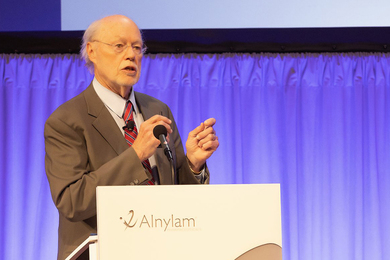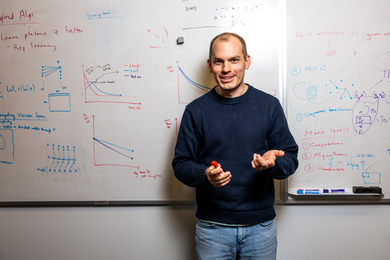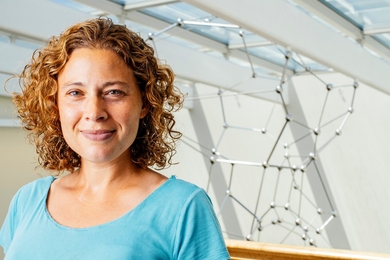Said and Done is the monthly, photo-rich publication from MIT's School of Humanities, Arts, and Social Sciences, integrating feature articles with news, research and events to give you a distilled overview of the school’s endeavors. For the complete edition, visit Said and Done. Highlights include:
Photo gallery from Commencement reception
Congratulations to our 2011 graduates! This gallery of photographs was taken at the school's festive Commencement reception on June 3. Photography by the MIT Technique team.
View gallery
Maier wins George Washington Book Prize
Pauline Maier, William R. Kenan Jr. Professor of American History in MIT's School of Humanities, Arts, and Social Sciences, has won the 2011 George Washington Book Prize for her book Ratification: The People Debate the Constitution, 1787-1788. Ratification has been widely hailed as the definitive story of the most consequential political debate in American history. The $50,000 Washington Book Prize is among the largest of the literary prizes.
Read more
Lawson named new director of the MISTI program
Chappell Lawson, an associate professor of political science at MIT and a member of the MIT Center for International Studies, has been named director of the MIT International Science and Technology Initiatives (MISTI). He succeeds Suzanne Berger, the Raphael Dorman-Helen Starbuck Professor of Political Science, as MISTI's director. Lawson will assume his new responsibilities on July 1.
Full story at MIT News
Infinite Mile History Project | Video interviews with leaders
The MIT150 Infinite History project presents first-person recollections by people who have made extraordinary contributions to their fields and to MIT. Twelve members of the school community are featured in the series: Suzanne Berger, Noam Chomsky, Peter Diamond, Ellen Harris, Philip Khoury, David Mindell, Shigeru Miyagawa, James Poterba, Paul A. Samuelson, Robert Solow, Charles Stewart and Rosalind Williams.
Watch interviews
School in the News | Media reports from around the world
A collection of recent news about the school's research in The New York Times, The Guardian, L.A. Times, The Washington Post, The Nation, The Wall Street Journal and other publications. This edition includes many reports and commentary about Institute Professor Emeritus Peter Diamond's decision to withdraw his nomination to the Federal Reserve Board.
Read more
Exhibit of James Howe's photographs opens in Panama's premiere museum
Taken in the 1970s, Howe's photos of celebration rituals among Panama’s Kuna people fascinate audiences — including the Kuna themselves. In his most recent book, Howe illuminates the dialogue at the heart of ethnography, and charts the Kuna's role in their own ethnography — a position that puts them at the forefront of anthropology's ongoing shift from an observational to a collaborative model.
Slideshow and story
Asian culture through a lens
"In 2002, two MIT professors, Shigeru Miyagawa and the Pulitzer Prize-winning historian John W. Dower, created a pioneering online education program called 'Visualizing Cultures' ... As it has grown over the years, Visualizing Cultures ... has become a kind of virtual museum ... an addictive and visually stunning one not just for scholars but for anyone with even a casual interest in Japan and China and their economic and cultural interplay over the last 300 years ... The site is a marvel."
Article at The New York Times
Research Portfolio
Research based in critical thinking is the engine for the school's capacity to help meet the world's great challenges. To name just a few areas of impact, the school's research helps alleviate poverty, safeguard elections, understand the past and present, improve health and energy policies, articulate morality, steer economies, plan space policy, assess the impact of new technologies, understand human language, advance musicology, conduct foreign policy, illuminate the U.S. Constitution, and create new forms at the juncture of art and science.
Research Portfolio
Taxation without documentation
New study co-authored by economist Benjamin Olken shows ‘informal taxation’ in developing countries is far greater than suspected, supporting public works — and adding a burden for the poor. Olken reveals that developing countries have extensive informal systems in which citizens contribute money and labor to public-works projects, a finding with implications for aid groups and governments trying to decide how to fund anti-poverty projects worldwide.
Story by Peter Dizikes at MIT News
Are we alone together?
"We’re seduced by the possibility that we’re always connected, always wanted, always needed,” says Sherry Turkle, adding that "we’re so enmeshed with our [electronic] connections that we neglect each other." Alone Together is based on 15 years of research and hundreds of interviews with children and adults. Turkle is the Abby Rockefeller Mauzé Professor of Social Studies of Science and Technology in MIT’s Program in Science, Technology, and Society.
Story by Liz Karagianis in MIT Spectrum
Bookshelf
The research of MIT's School of Humanities, Arts, and Social Sciences appears principally in the form of books and publications, as well as music and theater productions. These gems of the school provide new knowledge and analysis, innovation and insight, guidance for policy, and nourishment for lives.
Take a look
Said and Done | June 2011 Edition
For more information about the School of Humanities, Arts, and Social Sciences, check out these sites:
Calendar
The daily answer to what's happening
Facebook
Great fans change the world
Twitter
Great ideas in 140 characters
Subscribe
RSS News
Photo gallery from Commencement reception
Congratulations to our 2011 graduates! This gallery of photographs was taken at the school's festive Commencement reception on June 3. Photography by the MIT Technique team.
View gallery
Maier wins George Washington Book Prize
Pauline Maier, William R. Kenan Jr. Professor of American History in MIT's School of Humanities, Arts, and Social Sciences, has won the 2011 George Washington Book Prize for her book Ratification: The People Debate the Constitution, 1787-1788. Ratification has been widely hailed as the definitive story of the most consequential political debate in American history. The $50,000 Washington Book Prize is among the largest of the literary prizes.
Read more
Lawson named new director of the MISTI program
Chappell Lawson, an associate professor of political science at MIT and a member of the MIT Center for International Studies, has been named director of the MIT International Science and Technology Initiatives (MISTI). He succeeds Suzanne Berger, the Raphael Dorman-Helen Starbuck Professor of Political Science, as MISTI's director. Lawson will assume his new responsibilities on July 1.
Full story at MIT News
Infinite Mile History Project | Video interviews with leaders
The MIT150 Infinite History project presents first-person recollections by people who have made extraordinary contributions to their fields and to MIT. Twelve members of the school community are featured in the series: Suzanne Berger, Noam Chomsky, Peter Diamond, Ellen Harris, Philip Khoury, David Mindell, Shigeru Miyagawa, James Poterba, Paul A. Samuelson, Robert Solow, Charles Stewart and Rosalind Williams.
Watch interviews
School in the News | Media reports from around the world
A collection of recent news about the school's research in The New York Times, The Guardian, L.A. Times, The Washington Post, The Nation, The Wall Street Journal and other publications. This edition includes many reports and commentary about Institute Professor Emeritus Peter Diamond's decision to withdraw his nomination to the Federal Reserve Board.
Read more
Exhibit of James Howe's photographs opens in Panama's premiere museum
Taken in the 1970s, Howe's photos of celebration rituals among Panama’s Kuna people fascinate audiences — including the Kuna themselves. In his most recent book, Howe illuminates the dialogue at the heart of ethnography, and charts the Kuna's role in their own ethnography — a position that puts them at the forefront of anthropology's ongoing shift from an observational to a collaborative model.
Slideshow and story
Asian culture through a lens
"In 2002, two MIT professors, Shigeru Miyagawa and the Pulitzer Prize-winning historian John W. Dower, created a pioneering online education program called 'Visualizing Cultures' ... As it has grown over the years, Visualizing Cultures ... has become a kind of virtual museum ... an addictive and visually stunning one not just for scholars but for anyone with even a casual interest in Japan and China and their economic and cultural interplay over the last 300 years ... The site is a marvel."
Article at The New York Times
Research Portfolio
Research based in critical thinking is the engine for the school's capacity to help meet the world's great challenges. To name just a few areas of impact, the school's research helps alleviate poverty, safeguard elections, understand the past and present, improve health and energy policies, articulate morality, steer economies, plan space policy, assess the impact of new technologies, understand human language, advance musicology, conduct foreign policy, illuminate the U.S. Constitution, and create new forms at the juncture of art and science.
Research Portfolio
Taxation without documentation
New study co-authored by economist Benjamin Olken shows ‘informal taxation’ in developing countries is far greater than suspected, supporting public works — and adding a burden for the poor. Olken reveals that developing countries have extensive informal systems in which citizens contribute money and labor to public-works projects, a finding with implications for aid groups and governments trying to decide how to fund anti-poverty projects worldwide.
Story by Peter Dizikes at MIT News
Are we alone together?
"We’re seduced by the possibility that we’re always connected, always wanted, always needed,” says Sherry Turkle, adding that "we’re so enmeshed with our [electronic] connections that we neglect each other." Alone Together is based on 15 years of research and hundreds of interviews with children and adults. Turkle is the Abby Rockefeller Mauzé Professor of Social Studies of Science and Technology in MIT’s Program in Science, Technology, and Society.
Story by Liz Karagianis in MIT Spectrum
Bookshelf
The research of MIT's School of Humanities, Arts, and Social Sciences appears principally in the form of books and publications, as well as music and theater productions. These gems of the school provide new knowledge and analysis, innovation and insight, guidance for policy, and nourishment for lives.
Take a look
Said and Done | June 2011 Edition
For more information about the School of Humanities, Arts, and Social Sciences, check out these sites:
Calendar
The daily answer to what's happening
Great fans change the world
Great ideas in 140 characters
Subscribe
RSS News







